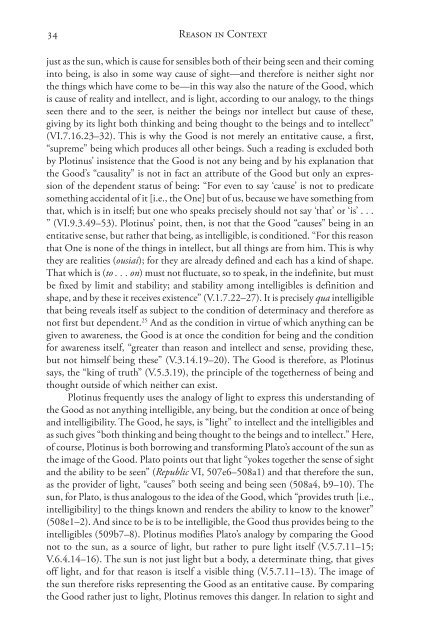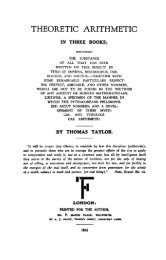Perl - The Good of the Intellect.pdf - Platonic Philosophy
Perl - The Good of the Intellect.pdf - Platonic Philosophy
Perl - The Good of the Intellect.pdf - Platonic Philosophy
Create successful ePaper yourself
Turn your PDF publications into a flip-book with our unique Google optimized e-Paper software.
34<br />
Reason in Context<br />
just as <strong>the</strong> sun, which is cause for sensibles both <strong>of</strong> <strong>the</strong>ir being seen and <strong>the</strong>ir coming<br />
into being, is also in some way cause <strong>of</strong> sight—and <strong>the</strong>refore is nei<strong>the</strong>r sight nor<br />
<strong>the</strong> things which have come to be—in this way also <strong>the</strong> nature <strong>of</strong> <strong>the</strong> <strong>Good</strong>, which<br />
is cause <strong>of</strong> reality and intellect, and is light, according to our analogy, to <strong>the</strong> things<br />
seen <strong>the</strong>re and to <strong>the</strong> seer, is nei<strong>the</strong>r <strong>the</strong> beings nor intellect but cause <strong>of</strong> <strong>the</strong>se,<br />
giving by its light both thinking and being thought to <strong>the</strong> beings and to intellect”<br />
(VI.7.16.23–32). This is why <strong>the</strong> <strong>Good</strong> is not merely an entitative cause, a first,<br />
“supreme” being which produces all o<strong>the</strong>r beings. Such a reading is excluded both<br />
by Plotinus’ insistence that <strong>the</strong> <strong>Good</strong> is not any being and by his explanation that<br />
<strong>the</strong> <strong>Good</strong>’s “causality” is not in fact an attribute <strong>of</strong> <strong>the</strong> <strong>Good</strong> but only an expression<br />
<strong>of</strong> <strong>the</strong> dependent status <strong>of</strong> being: “For even to say ‘cause’ is not to predicate<br />
something accidental <strong>of</strong> it [i.e., <strong>the</strong> One] but <strong>of</strong> us, because we have something from<br />
that, which is in itself; but one who speaks precisely should not say ‘that’ or ‘is’ . . .<br />
” (VI.9.3.49–53). Plotinus’ point, <strong>the</strong>n, is not that <strong>the</strong> <strong>Good</strong> “causes” being in an<br />
entitative sense, but ra<strong>the</strong>r that being, as intelligible, is conditioned. “For this reason<br />
that One is none <strong>of</strong> <strong>the</strong> things in intellect, but all things are from him. This is why<br />
<strong>the</strong>y are realities (ousiai); for <strong>the</strong>y are already defined and each has a kind <strong>of</strong> shape.<br />
That which is (to . . . on) must not fluctuate, so to speak, in <strong>the</strong> indefinite, but must<br />
be fixed by limit and stability; and stability among intelligibles is definition and<br />
shape, and by <strong>the</strong>se it receives existence” (V.1.7.22–27). It is precisely qua intelligible<br />
that being reveals itself as subject to <strong>the</strong> condition <strong>of</strong> determinacy and <strong>the</strong>refore as<br />
not first but dependent. 25 And as <strong>the</strong> condition in virtue <strong>of</strong> which anything can be<br />
given to awareness, <strong>the</strong> <strong>Good</strong> is at once <strong>the</strong> condition for being and <strong>the</strong> condition<br />
for awareness itself, “greater than reason and intellect and sense, providing <strong>the</strong>se,<br />
but not himself being <strong>the</strong>se” (V.3.14.19–20). <strong>The</strong> <strong>Good</strong> is <strong>the</strong>refore, as Plotinus<br />
says, <strong>the</strong> “king <strong>of</strong> truth” (V.5.3.19), <strong>the</strong> principle <strong>of</strong> <strong>the</strong> toge<strong>the</strong>rness <strong>of</strong> being and<br />
thought outside <strong>of</strong> which nei<strong>the</strong>r can exist.<br />
Plotinus frequently uses <strong>the</strong> analogy <strong>of</strong> light to express this understanding <strong>of</strong><br />
<strong>the</strong> <strong>Good</strong> as not anything intelligible, any being, but <strong>the</strong> condition at once <strong>of</strong> being<br />
and intelligibility. <strong>The</strong> <strong>Good</strong>, he says, is “light” to intellect and <strong>the</strong> intelligibles and<br />
as such gives “both thinking and being thought to <strong>the</strong> beings and to intellect.” Here,<br />
<strong>of</strong> course, Plotinus is both borrowing and transforming Plato’s account <strong>of</strong> <strong>the</strong> sun as<br />
<strong>the</strong> image <strong>of</strong> <strong>the</strong> <strong>Good</strong>. Plato points out that light “yokes toge<strong>the</strong>r <strong>the</strong> sense <strong>of</strong> sight<br />
and <strong>the</strong> ability to be seen” (Republic VI, 507e6–508a1) and that <strong>the</strong>refore <strong>the</strong> sun,<br />
as <strong>the</strong> provider <strong>of</strong> light, “causes” both seeing and being seen (508a4, b9–10). <strong>The</strong><br />
sun, for Plato, is thus analogous to <strong>the</strong> idea <strong>of</strong> <strong>the</strong> <strong>Good</strong>, which “provides truth [i.e.,<br />
intelligibility] to <strong>the</strong> things known and renders <strong>the</strong> ability to know to <strong>the</strong> knower”<br />
(508e1–2). And since to be is to be intelligible, <strong>the</strong> <strong>Good</strong> thus provides being to <strong>the</strong><br />
intelligibles (509b7–8). Plotinus modifies Plato’s analogy by comparing <strong>the</strong> <strong>Good</strong><br />
not to <strong>the</strong> sun, as a source <strong>of</strong> light, but ra<strong>the</strong>r to pure light itself (V.5.7.11–15;<br />
V.6.4.14–16). <strong>The</strong> sun is not just light but a body, a determinate thing, that gives<br />
<strong>of</strong>f light, and for that reason is itself a visible thing (V.5.7.11–13). <strong>The</strong> image <strong>of</strong><br />
<strong>the</strong> sun <strong>the</strong>refore risks representing <strong>the</strong> <strong>Good</strong> as an entitative cause. By comparing<br />
<strong>the</strong> <strong>Good</strong> ra<strong>the</strong>r just to light, Plotinus removes this danger. In relation to sight and
















